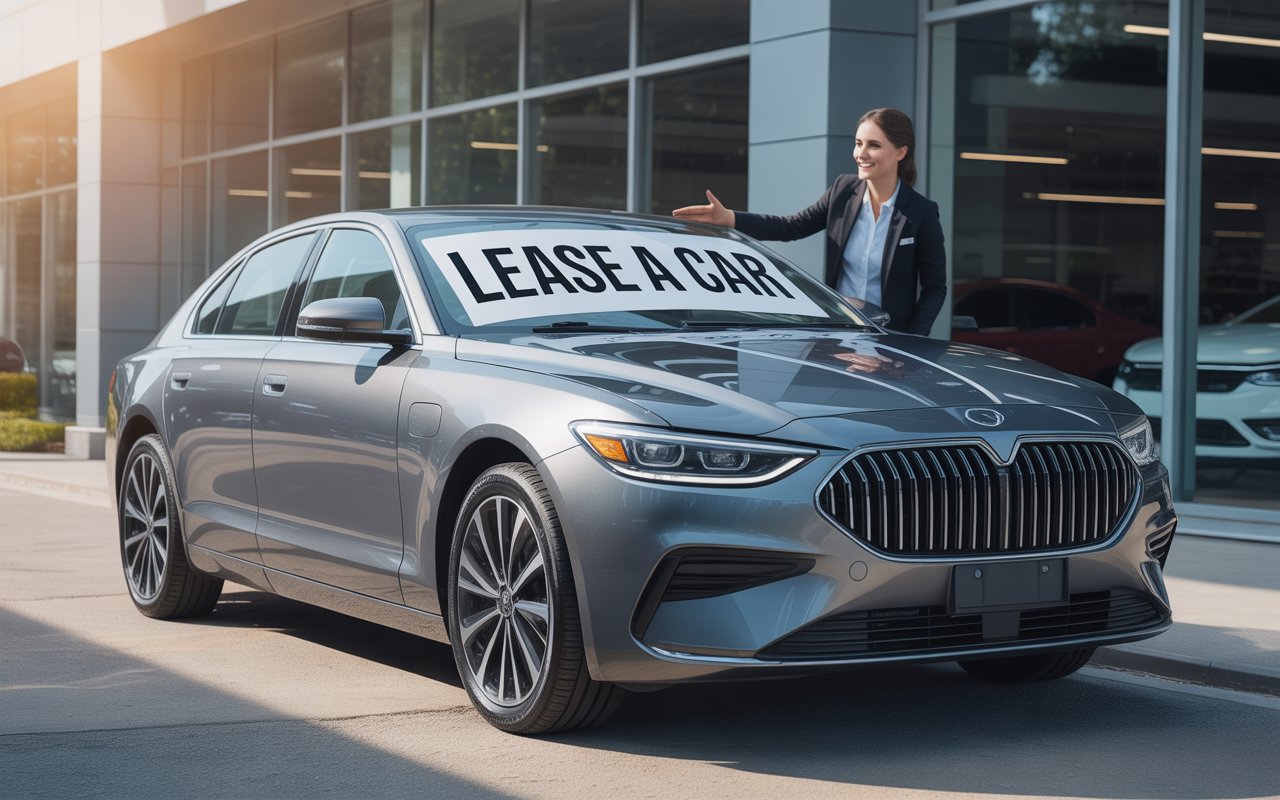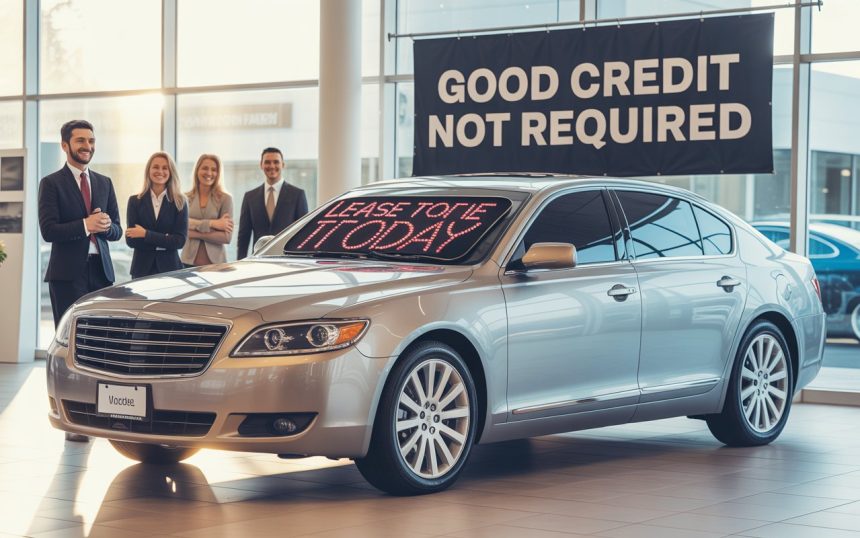Car leasing is often seen as the smart way to drive a reliable vehicle without committing to a hefty car loan. But if you’ve ever struggled with credit issues, you may be wondering: Can I lease a car with bad credit? The answer is yes—though the road may not be as smooth as it is for someone with a higher credit score. With the right strategies and knowledge, you can still get behind the wheel of a leased car even if your financial history isn’t spotless.
In this article, we’ll explore every angle of leasing a car with poor credit, from how it works and what to expect, to tips for improving your chances of approval. Think of this as your step-by-step navigation system to get you from uncertainty to confidence.
Understanding Car Leasing in Simple Terms
“Before tackling the hurdles of bad credit, let’s break down what car leasing actually involves.” Leasing a car is like renting an apartment. You don’t own the car, but you get to use it for a set period—usually 2 to 4 years—by making monthly payments. “When the lease term ends, you simply hand the car back—or, if you choose, purchase it for a set price agreed upon in advance.”
For many people, leasing is appealing because:
-
The monthly payments are usually lower compared to buying.
-
You get to drive a new car every few years.
-
Most cars leased are under warranty, which reduces repair costs.
Sounds perfect, right? Well, the catch comes when your credit report is less than stellar.
How Credit Scores Affect Car Leasing
“Your credit score is the yardstick leasing companies use to judge how reliable you are as a borrower.” To them, your credit history is like a “trust score.” A higher score says, This person is reliable and pays bills on time. A lower score says, This person has struggled in the past—there’s more risk involved.
Here’s how your credit rating can impact leasing:
-
Approval chances – The higher your score, the easier it is to qualify.
-
Monthly payments – With bad credit, you may face higher payments.
-
Down payment – Dealers may require a larger upfront payment if they view you as risky.
-
Lease terms – You may get fewer perks, like less flexibility in mileage limits.
What Counts as Bad Credit?

Credit scores generally range from 300 to 850. While every leasing company has its own cut-off point, here’s a general breakdown:
-
Excellent (720 and above) – Best approval odds and lowest payments.
-
Good (660–719) – Still good chances with fair terms.
-
“Fair (600–659) – You may get approved, though expect steeper costs and less favorable terms.”
-
Poor (below 600) – Challenging, but not impossible.
If your score falls in the poor category, leasing might be more difficult—but not out of reach.
Challenges of Leasing with Poor Credit
Leasing a car with a bad credit history comes with unique hurdles. Here are the main ones:
-
Higher upfront costs – Dealers may ask for a bigger down payment to reduce their risk.
-
Limited choices – You might not qualify for luxury brands or promotional deals.
-
Higher interest rates (money factor) – Even though leases aren’t “loans” in the traditional sense, you’ll still pay more in the form of interest-like charges.
-
Stricter requirements – Proof of steady income and employment history may be needed.
It’s a bit like renting an apartment with a low credit score. The landlord (in this case, the dealer or leasing company) wants reassurance that you’ll pay on time.
Why Leasing Might Still Be Better Than Buying
You might wonder, “If my credit is bad, wouldn’t it be smarter to buy a used car instead?” Not necessarily. Here’s why leasing could still be a better option:
-
“Monthly payments are typically lighter than taking out a loan for a brand-new car.”
-
Less risk of breakdowns, since most leased cars are brand-new.
-
Flexibility to upgrade once your credit improves in a few years.
-
Certified pre-owned leases – Some manufacturers lease out slightly used cars, which can be more affordable.
So while it’s not always easy, leasing can still be a smart path to reliable transportation.
Tips to Improve Your Chances of Leasing with Bad Credit

If your score isn’t great, don’t lose hope.
“You can boost your odds of getting approved by following a few smart strategies:”
1. Show proof of steady income
Dealers feel more comfortable if they see you’ve got a stable job. Pay stubs, tax returns, or direct deposit records can go a long way.
2. Save for a larger down payment
Putting more money upfront reduces the dealer’s risk. Think of it as showing good faith.
3. Consider a co-signer
Having a trusted friend or family member with strong credit co-sign can dramatically increase your approval odds.
4. Start with a cheaper car
Luxury vehicles may be out of reach, but compact or mid-range models are more accessible.
5. Negotiate smartly
Don’t be afraid to ask for better terms. Dealers want to move inventory, and sometimes they’ll bend.
Alternatives to Leasing with Bad Credit
Leasing isn’t the only option if your credit history isn’t ideal. Consider these alternatives:
-
“Buy here, pay here dealerships – These offer in-house financing, though usually at steep interest rates.”
-
Certified pre-owned financing – Buying a slightly used car may be cheaper in the long run.
-
Short-term rentals or subscription services – Some companies now offer car subscriptions instead of leases.
-
Improve your credit first – If you’re not in urgent need of a car, waiting a few months while boosting your credit can save thousands.
How to Prepare Before Applying
Preparation is key when dealing with credit challenges. Here’s a quick checklist before visiting a dealership:
-
Review your credit report for errors (and dispute them if necessary).
-
“Figure out a monthly payment amount that fits comfortably within your budget.”
-
Save money for a possible security deposit.
-
Gather documents (income proof, references, bank statements).
Walking in prepared shows dealers that you’re serious and financially responsible, even if your score suggests otherwise.
Common Misconceptions About Leasing with Poor Credit

There are several myths surrounding car leasing and credit scores. Let’s clear them up:
-
Myth: Bad credit means automatic rejection. Not true—many dealerships work with subprime customers.
-
Myth: Leasing always costs more than buying. Not always; leases can be cheaper month-to-month.
-
Myth: All dealerships have the same rules. Each leasing company sets its own criteria.
-
Myth: Co-signers are always required. A co-signer helps, but it’s not mandatory.
Long-Term Strategy: Using Leasing to Rebuild Credit
“The good news is that leasing can help repair your credit, as long as you stay consistent with on-time payments.” Each monthly payment gets reported to credit bureaus, which gradually improves your score. Think of it as turning a negative into a positive.
Within a couple of years, your credit could be strong enough to qualify for better lease terms or even an affordable car loan.
Final Thoughts
Leasing a car with bad credit may feel like climbing a steep hill, but with preparation, determination, and smart strategies, it’s entirely possible. The key is to know what to expect, be realistic with your options, and prove to dealers that you’re capable of making timely payments.
Just like navigating a winding road, it may take extra effort and patience, but eventually, you’ll reach your destination: driving away in a reliable car that fits your needs and budget.
FAQs
1. Can I lease a car if my credit score is below 600?
Yes, it’s possible, though approval is tougher. You may need a larger down payment or a co-signer.
2. Will leasing a car improve my credit score?
If you make payments on time, leasing can positively impact your credit by building a stronger payment history.
3. Is it better to lease or buy with bad credit?
It depends. Leasing may mean lower payments, while buying could give you ownership. Consider your long-term financial goals.
4. Can I negotiate lease terms with poor credit?
Yes. While you may not get promotional offers, you can still negotiate monthly payments, mileage, and upfront costs.
5. What documents do I need to lease with bad credit?
Typically, you’ll need proof of income, ID, proof of residence, and possibly references or a larger security deposit.











